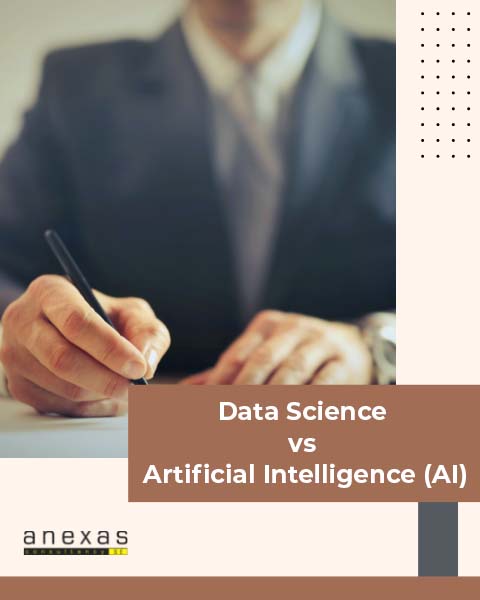Data Science vs Artificial Intelligence (AI)
“Artificial intelligence is not a subset of Data science.” Though each of the fields can be correlated. The main goal of Data Science is to identify meaningful information from the huge amount of data to make conclusions that can help in decision-making. The main goal of Artificial Intelligence is the automation of the process and bringing ease to the process by giving autonomy to the data model.
This article will discuss the key difference in approaches, challenges, and scope of both fields. We will clear some of the most common myths about AI and Data Science
To know more about Data Science and the use of Artificial Intelligence in data science, you may join this while you interact and learn about the concepts of data science from industry experts

What are the key differences between Data Science and Artificial Intelligence?
The main difference between Data Science and Artificial Intelligence (AI) is thatData science is used in data modeling, research, and decision-making using computer science, statistics & computer science. AI (Artificial intelligence) is an implementation of predictive models to simulate human intelligence.

The rectangle represents the Data Science skills; you can clearly see the domain of Data Science vs. Artificial Intelligence. The competency required for artificial intelligence, especially in linguistics, vision, sensors, robotics, and planning language synthesis.
What is Data Science?
Data science, is the process of extracting useful insights from unorganised data. It’s an interdisciplinary approach that merges various fields of computer science, statistics, and scientific processes and methods to draw conclusions from raw data points that might be used in decision-making for a business. Use of data science in businesses:
- Data science consists of lots of skills and concepts that can be used in various industries like healthcare, IT, Service, Supply chain, E-commerce, research, and many more.
- Data science involves lots of skills like data mining, data modelling, correlation etc., which are used to get the necessary information from ad hoc data.
- Finding patterns and research on a given set of unorganised data is another application of data science, using algorithms, programming, and hypothesis tests to find meaningful patterns from data helps in increasing the business of the organisation.
Skills required in Data Science
Following are the skills sets required for excelling in data science:
- Experience using arithmetical computer languages such as R, Python, SQL, etc.
- Familiarity working with and creating data architectures.
- Knowledge of superior statistical techniques and concepts, including weakening, properties of distributions, and numerical tests.
- Knowledge of machine learning methods such as clustering, decision tree learning, and artificial neural networks.
- Experience with distributed data: Map/Reduce, Hadoop, Hive, Spark, MySQL, etc.
Use of Data Science.
Following are the application of data science in various industries.
- Patterns: To target potential customers in the market, data scientists find patterns in the activity performed by the customers.
- Trends: the business trend is the indicator for the stock market and decisions can be made accordingly.
- Mathematical modeling: Different mathematical models of data can help in organizing ad hoc data and finding meaningful information from the huge amount of data for decision-making
- Predictive analysis: Monitoring the trend by using algorithms and statistics data science can predict outcomes of the future in each process.
- Statistics: Statistics is a tool data scientists must be an expert at; using statistics data scientists can do complex analyses and using hypothesis tests they can draw conclusions
- Research: Researchers work using concepts of data science to do research work, in various fields like healthcare, service, IT & Software, Supply chain, etc
Career in Data Science
Undoubtedly, data is more important for any product-based or service-based industry. As data is available in different formats, there is always a lack of professionals who can organize it. Create structure, analyze the data, and interpret it in an effective and efficient way to take business decisions
- As per emerging jobs report by LinkedIn, Data science witnessed the fastest growth over 650 % growth since 2012.
- Data science job openings raised more than 60% in the United States as per the survey in 2019 by LinkedIn.
- The impact of Covid even did not slow down the progress of Data science jobs which in turn raised the growing size of Data Scientists.
Let us discuss some job profiles and their roles in the businesses
- Data analyst: The main role of Data Analysts is to take out meaningful information from existing data and present them to key stakeholders and business owners. Data analyst answers all questions required to answer from a business point of view.
- Statistician: Statisticians practice the science of using data to make decisions. They decide what data they need and how to collect it, design experiments, collect data, analyze, and interpret data, and report conclusions
- Big data engineer: A big data engineer is an information technology (IT) professional who is responsible for designing, building, testing, and maintaining complex data processing systems that work with large data sets
- Data Engineer: A data engineer is an IT professional whose primary job is to prepare data for analytical or operational uses. These software engineers are typically responsible for building data pipelines to bring together information from different source systems.
- Data Scientist: Data Scientists follow statistical analysis to handle the past data behaviour and analyse the existing pattern and use it for future prediction for business services to make decisions. Data Scientists play an important role in an organisation to support top management in forecasting all strategic business decisions.
What is Artificial Intelligence?
Artificial intelligence is more discussed among top skills than data science. It is used in a variety of industries. AI-based technology is so common nowadays that we don’t even notice them in our day-to-day lives. Artificial intelligence is used in smartphone assistance, E-shopping portal, home control, GPS maps, self-driving cars, and many more.
Type of Artificial Intelligence
There are 3 types of artificial intelligence.
- Reactive AI: Has no memory of its own, it only responds to different stimuli given by the user. For example, Chess playing Computer, Netflix recommendations, spam filters etc.
- Limited memory AI: HereAI uses memory to learn and improve its response. For example, Google maps, car speed detectors, mileage calculators etc.
- Theory of mind: AI understands the needs and requirements of other intelligent entities. For example, self-driving cars.
- Self-aware AI: This AI has human-like intelligence and is self-aware. It can perform all the tasks on its own and doesn’t require any command. This is under development, and we will definitely see such robots in near future.
Few examples of Artificial intelligence applications are given below:
- Self-driving cars like Tesla, where AI is taking decisions based on external scenarios on the road, and efficiently controlling and developing driving skills like humans.
- The smartphone assistants perform tasks just by taking voice commands from users.
- The home controls AI-based system can open the door, switch on lights, fan, AC, open curtains, play our favourite program on TV and many more.
Skills required in Artificial Intelligence
The skills required for Artificial intelligence professionals are given below:
- Programming languages: Python
- AI systems
- Computer science
- Deep learning
- Cloud working
- Data Engineering
- Exploratory data analysis
- Data modeling
- Deploying
- Security
Use of Artificial Intelligence
Following are the uses of Artificial Intelligence in businesses
- Personalized Shopping.
- AI Assistant.
- Fraud prevention.
- Administrative task automation.
- Personalized learning.
- Text to speech or voice to text.
- Facial recognition.
- Self-driving cars.
- Spam filters/ chatbots
- Space exploration
- AI robots for performing tasks
- Drug research in healthcare.
- AI for agriculture to harvest crops in high volume.
- Ai in video games to give a realistic experience.
Career in Artificial Intelligence
Over the past few years, Artificial Intelligence is becoming a top skill to pursue a career in a lot of companies. The hiring rate is growing at the rate of 32% over the past couple of years. There is a high demand for AI professionals because of the high talent gap
Few profiles in Artificial intelligence are given below
- Machine Learning Engineer: They leverage big data tools and programming frameworks to create production-ready scalable data science models that can handle terabytes of real-time data.
- Research scientist: The research scientist role is one of the most academically driven AI careers. They ask new and creative questions to be answered by AI.
- Big data engineer:The big data engineers and architects develop ecosystems that enable various business verticals and technologies to communicate effectively. Big data engineers and Architects typically are tasked with planning, designing, and developing big data environments on Hadoop and Spark systems
- Robotic engineer: The robotics engineer is perhaps one of the first AI careers. From the assembly lines to teaching English, robotics has come a long way. Healthcare uses robot-assisted surgeries. Humanoid robots are being built to be personal assistants. A robotics engineer’s job is to make all this and more happen.
- NLP Engineer: Natural Language Processing (NLP) engineers are AI professionals who specialise in human language, including spoken and written information. The engineers who work on voice assistants, speech recognition, document processing, etc.
Which is a better career option for you? Data Science or Artificial Intelligence (AI)
AI specialists had been topped as one of the most sought-after jobs in the AI field at the beginning of 2020. No need to mention that the world needs more data scientists to fill the talent gaps. While the job market is still booming, it is recommended for professionals to upgrade their skills in both fields. Both AI and data science are having good salaries based on the skills and experience you have. Considering your background and skill set you can choose your career based on your interest. The career growth in both fields is immense.
Conclusion:
In this article, we have seen the correlation between Artificial Intelligence and Data Science. There is a huge demand for data science and artificial intelligence professionals in 2022. The applications of data science and AI are immense in various fields of industries. The skills required to become successful in data science and AI are knowledge of computer science, mathematics, statistics, and programming language.
FAQ
How is Artificial Intelligence different from data science?
Data Science is a detailed process that mainly involves pre-processing analysis, visualisation, and prediction. AI is the implementation of a predictive model to forecast future events and trends.
Who earns more data scientist or AI?
An entry-level data scientist can earn as much as $93,167 per year, while an AI Engineer earns as much as $100000 per year.
Which is easy data science or AI?
When compared to the traditional statistical analysis techniques, machine learning evolves as a better way of extraction and processing the most complex sets of big data, thereby making data science easier and less chaotic.
Can data scientists become AI Engineers?
it is much more likely AI will become extremely intelligent assistants to data scientists, to run most complex analytics.
Does AI need coding?
Yes, if you’re looking to pursue a career in artificial intelligence and machine learning, a little coding is necessary
Which is better: an AI engineer or data scientist?
A data scientist builds machine learning models on IDE’s while an AI engineer builds a deployable version of the model built by data scientists and integrates these models with the end product
Should I do data science or artificial intelligence?
Data scientists ranked as third-best among technology jobs, while a machine learning engineer was named the best job in 2019. If you decide to learn programming and statistical skills, your knowledge will be useful in both careers.
How to contact anexas for the course?
Anexas is providing a course on data science, please contact us [email protected] or call us at +918762780122 (india) +971-503618638 (UAE) & 966540911351, +966548229461, +966542731565 (KSA)
Do I get career assistance from anexas after the course?
Yes, Please get complete details by following the link https://anexas.net/course/data-science-advanced-course/





